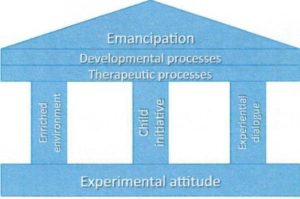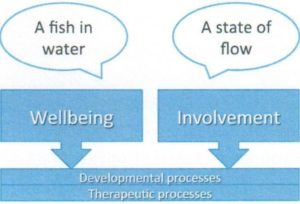
Monitoring well-being and involvement by Rev Peter Michell
In the UK the most immediate association made with assessment is the Early Years Foundation Stage and the ‘outcomes’. We also think of endless laborious record keeping. This first association has to be called into question because it is not the only kind of assessment and it is not the most important either. If we are to observe and assess the most important things happening in young children in our nurseries and schools, surely we should turn our attention to spiritual development and characteristics of effective learning.
Both these would probably require us to do some new and creative thinking. But there is another foundational area for monitoring in which we already have valuable tools: ‘Well-being and Involvement’.
Many of us have long been aware of the work of Professor Ferre Laevers of Leuven University and his process oriented model. He has been engaged in this area of work for decades and has been very influential in our thinking. The experiential approach along with the Leuven Scales offers a simple but very powerful tool for supporting children to ensure there is, what Professor Laevers calls, ‘deep level learning’.
The essence of the theory is that central to learning is the process, and the process of learning is effective when there is a high level of well-being and a high level of involvement. We can observe children with a view to monitoring these two things. We can score both on a scale of 1-5 on the basis of identified criteria for the sake of a degree of objectivity. Then all-importantly, if the levels are less than moderate we will act to support the child. Professor Laevers offers ten action points to guide us in making changes in order to support the individual children. The benefits of this kind of monitoring are immediately apparent. Those who genuinely care about the young, as surely Christians must, will be concerned that children are happy and comfortable in the setting. Ferre Laevers speaks of wellbeing in terms of the child being like ‘a fish in water’. That is what we would want for children for the sake of their immediate comfort, but it is also what will give opportunity for them to become really involved in their activity. There is some correlation between the level of welling and the level of involvement.
Involvement is described by Ferre Laevers as being ‘in a state of flow’. There is sustained and concentrated activity and application of mind. When this is in evidence we may be sure that there is learning taking place. The practitioner will interact with the child to scaffold the learning. If we see a high level of involvement we will want to observe and record the process and achievement.
There is a whole range of practical issues that arises.
- the appearance of well-being in the context of the child’s temperament – some children may be more difficult to interpret than others
- the outward appearance of involvement at youngest ages – practitioners need to be able to recognise the indicators of involvement in the youngest children and schema theory will help our understanding.
- the involvement of children may not focus on an adult approved activity(!) but it does not detract from the level of involvement. Adult convenience is incidental to the matter of involvement.
This approach will satisfy our desire for children’s happiness and the pedagogical necessity to support children’s learning. It is a very useful instrument in our toolbox for formative assessment. It is compassionate, realistic and practical. It also addresses what really matters in educational terms: that is, the child’s motivation which is a key factor in children’s learning and development.
Reference: Laevers F, Experiential Education: making care and education more effective through well-being and involvement



